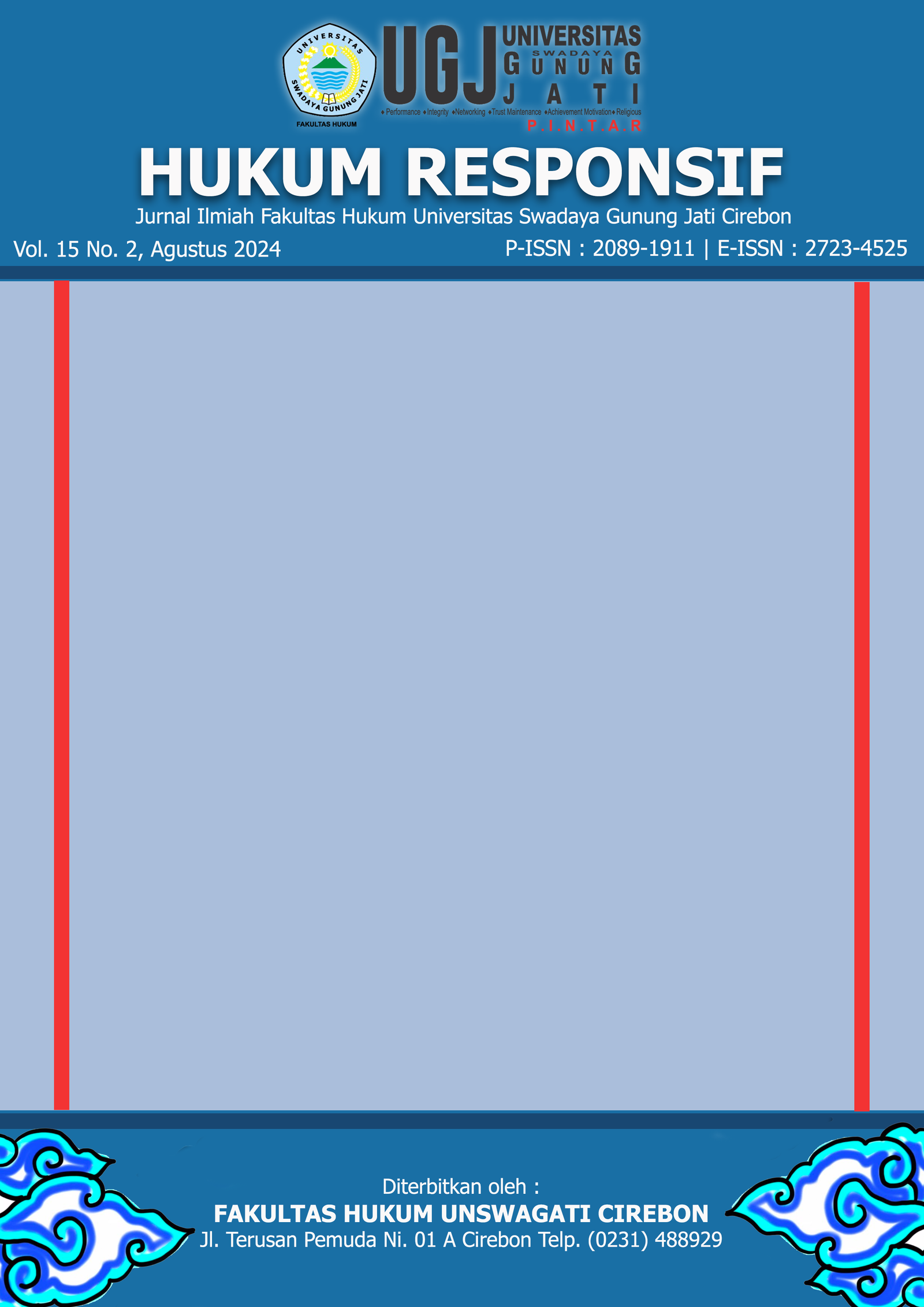AGRARIAN REFORM IN THE CONTEXT OF INCREASING POOR PEASANTS' ACCESS TO LAND TENURE IN INDONESIA
DOI:
https://doi.org/10.33603/responsif.v15i2.9481Kata Kunci:
Agrarian Reform, Poor Farmers, Land TenureAbstrak
The development of Indonesian society has a goal, as stated in the fourth paragraph of the Preamble of the 1945 Constitution of the Republic of Indonesia, then from that to form an Indonesian State Government that protects the entire Indonesian nation and the entire homeland of Indonesia. Article 33 Paragraph (3) of the 1945 Constitution of the Republic of Indonesia states that the land and water and the natural resources contained therein are controlled by the state and used for the greatest prosperity of the people. In connection with the demands for reform in all areas of development, the People's Consultative Assembly in 2001 issued Decree No. IX/MPR/2001 on Agrarian Reform and Natural Resource Management, and MPR Decree No. 5/MPR/2003 on the Assignment to the Leaders of the MPR to Provide Advice on the Implementation of MPR Decisions by the President, DPR, MA, BPK. The Basic Agrarian Law Number 5 of 1960 as the foundation of national land law based on Article 33 paragraph (3) of the 1945 Constitution of the Republic of Indonesia, the land provisions are aimed at achieving social justice for the entire community in relation to the acquisition and utilization of natural resources, especially land. Agrarian reform or Agrarian Reform as an issue, is complex and multidimensional, which is a major program of the Indonesian state in realizing the welfare of the Indonesian people, especially in terms of increasing the access of poor peasants to land tenure in Indonesia, but in implementing agrarian reform it is not an easy thing, there are many obstacles, both from the legal, land administration, social, political, cultural and security aspects.
Referensi
Berharnhard Limbong, Reforma Agraria, Pustaka Margaritha, Surabaya, 2012
H. Mohammad Hatta, Hukum Tanah Nasional Dalam Perspektif Negara Kesatuan, Hukum Tanah Antara Teori dan Kenyataan Berkaitan dengan Kesejahteraan dan Persatuan Bangsa, Media Abadi, Jakarta, 2013
H. Riduan Syarani, Rangkuman Intisari Ilmu Hukum, Edisi Revisi, Citra Aditya Bakti, Bandung, 2004, hlm. 24.
Harsono, Budi. Hukum Agraria Indonesia Sejarah Pembentukan Undang-Undang Pokok Agraria, Isi Dan Pelaksanaannya, Jilid 1, Hukum Tanah Nasional, Djambatan, 2008 http;/bisnis.liputan6.com/read/2089809/sensus-bps-penduduk-miskin-ri sebagianbesarpetani,
Limbong, Bernhard. Reforma Agraria, Pustaka Margaretha, 2012
Maria S.W. Sumardjono, Aneka Masalah Hukum Agraria, Puspita Serangkum, Yogyakarta, 2001, hlm. 4.
Mariadi, Ni Nyoman. Tesis, Kewenangan Pemerintah Dalam Menetapkan Penguasaan Dan Pemilikan Luas Tanah Pertanian, Program Magister, Program Studi Ilmu Hukum, Program Pasca Sarjana, Universitas Udayana, Denpasar, 2011.
Mochtar Kusumaatmadja, Hukum Masyarakat dan Pembinaan Hukum Nasional, Binacipta, Bandung, 2017, hlm. 13.
Ronny Sautma Hotma Bako, Masa Depan Reforma Agraria Di Indonesia, P3DI Setjen DPR RI, rsh bako @yahoo.com
Soerjono Soekanto, Pokok-Pokok Sosiologi Hukum, Rajawali, Jakarta, 2016, hlm, 169.
Supriadi. Hukum Agraria, Sinar Grafika, Jakarta, 2013.
Undang-Undang Dasar Republik Indonesia Tahun 1945.
Undang-Undang Nomor 5 Tahun 1960 tentang Pokok-Pokok Agraria. TAP MPR Nomor IX/TAP MPR/2001.
Unduhan
Diterbitkan
Terbitan
Bagian
Lisensi
Hak Cipta (c) 2024 Anggiat Tobing, Seno Tri Praptono, Pramu Hestiono, Eva Berta Pattinasarany

Artikel ini berlisensiCreative Commons Attribution-ShareAlike 4.0 International License.
The Authors submitting a manuscript do so on the understanding that if accepted for publication, copyright of the article shall be assigned to Jurnal HUKUM RESPONSIF, Fakultas Hukum Universitas Swadaya Gunung Jati. Universitas Swadaya Gunung Jati as publisher of the journal. Copyright encompasses rights to reproduce and deliver the article in all form and media, including reprints, photographs, microfilms, and any other similar reproductions, as well as translations.
Jurnal HUKUM RESPONSIF, Universitas Swadaya Gunung Jati and the Editors make every effort to ensure that no wrong or misleading data, opinions or statements be published in the journal. In any way, the contents of the articles and advertisements published in Jurnal HUKUM RESPONSIF the sole responsibility of their respective authors and advertisers.

















